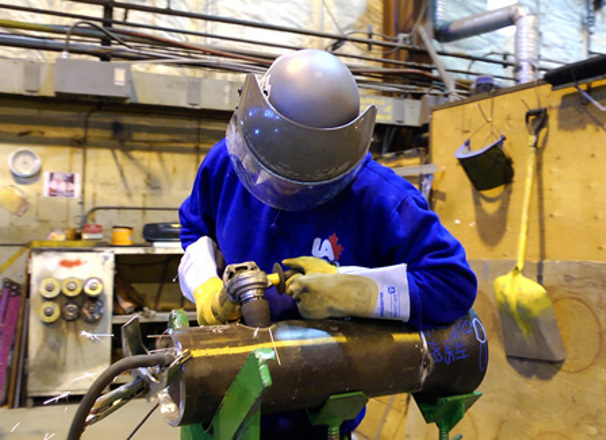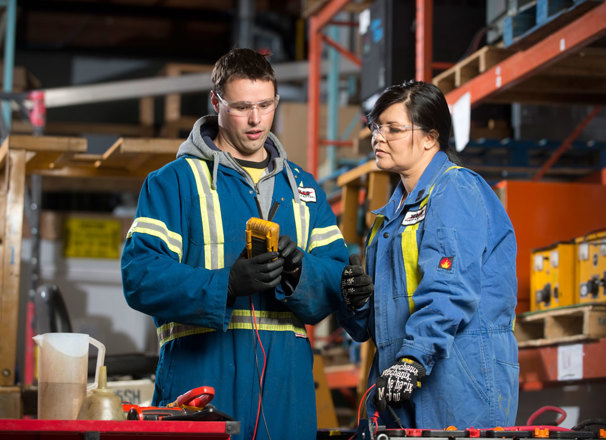Could a job in the trades be right for you? Read on to learn more about the resources and apprenticeship programs that can help Indigenous workers like you get started in the trades and support you through to becoming a journeyperson.
Designated trades—trades that have compulsory or optional certification—make up a significant part of Alberta’s workforce and play a vital role in its economy. Careers in the trades range from bakers and hairstylists to carpenters and ironworkers.
You may be attracted to the trades by the:
- Opportunities to use your existing skills
- Ability to earn money while you train in apprenticeship programs
- Programs that help pay for your tools and training
- Additional career opportunities following certification, such as running your own business
Working in the trades requires a combination of manual skills and specialized technical training. Some trades are physically demanding, and some require you to work outdoors. Take the time to explore your options and find a career that’s the right fit for you.
Discover the trades that interest you
You may already be familiar with some of Alberta's designated trades. Here are some resources where you can learn more about them.
- Search OCCinfo for occupational profiles by either the trade name or the alphabetical index. Trade profile information includes the following:
- Employment outlook. Includes a short-term and long-term employment view.
- Average wages. As an apprentice, you earn a wage while you train.
- Personal characteristics required of tradespeople. Some trades are physically demanding and the work is often outdoors. Check the required characteristics to understand the type of work you would be doing.
- Entrance requirements. Entrance requirements to start an apprenticeship program are in place to make sure you can complete the required post-secondary classroom instruction and earn an Alberta Journeyman Certificate.
- Occupational Videos. You can watch real people on the job in Alberta, both in the trades and in many other occupations.
- At Tradesecrets, you can learn more about each trade’s duties, working conditions, training requirements, required skills, and abilities.
- Look for profiles and videos of Indigenous workers in the trades on:
Find out how to get started in the trades
Once you've decided on the trade that interests you, it’s time to find out how to get started in your new career. There are programs in place to help Indigenous workers enter the trades, as well as support you through to your journeyperson status.
- Find a sponsor who agrees to set you up with paid employment and mentorship in your trade. Finding a sponsor takes time and patience but it is the very best investment you can make in your future. Here are some ideas to help you:
- Talk with people in your network. It’s possible that friends, relatives and former or current employers can help you find a sponsor.
- Search thousands of Alberta job postings here on alis. You can narrow your search to trades-related job postings or just apprenticeships.
- Use job banks and job search engines to find job openings. Some sites, such as Indigenous Careers and First Nations Jobs Online, cater to job seekers within the Indigenous community.
- Use the Building Trades of Alberta’s links to trade union job boards and careers with industry partners.
- Visit an Alberta Supports Centre or call the contact centre for further job search tips.
- Complete the online application to become an apprentice. Here are some things to know before you fill out your application:
- Your sponsor must agree to be named on your apprenticeship application and Apprenticeship Education Agreement.
- Your apprenticeship program combines on-the-job training (80% of the program) and classroom instruction (20%) through a college or technical institute. Many of these schools provide additional supports for Indigenous students, so be sure to ask.
- Your apprenticeship program will take 1 to 4 years to complete, depending on the trade.
- When you successfully complete your apprenticeship, you will have earned an Alberta Journeyman Certificate.
- If you are in training in a Red Seal trade, you may write a Red Seal exam at the end of your final training period. If successful, you will receive a Red Seal on your journeyperson certificate. This allows you to work anywhere in Canada without further training or examinations.
Programs that help Indigenous workers enter the trades
There are a number of programs to help Indigenous workers choose an apprenticeship program and meet its entrance requirements.
- Trade Winds to Success offers trade orientation and pre apprenticeship education programs to help Indigenous people qualify to join the following building trades: boilermaker, carpenter, electrician, insulator, ironworker, millwright, plumber, steamfitter/pipefitter and welder. The program focuses on Indigenous people living in Edmonton and Calgary.
- A Prior Learning Assessment can help you gain recognition for your previous work experience or the successful completion of a recognized pre-employment program.
Financial assistance may be available to you to help fund your apprenticeship education. Many loans, grants, and scholarships help pay for expenses such as classroom instruction fees, tools, equipment, living expenses, and family support. For more information, visit the Tradesecrets website, drop in to an Apprenticeship and Industry Training office for in-person service, or call the toll-free line at 1-800-248-4823.
Other funding options are available to Indigenous learners, some of which may apply to apprenticeship programs. Check out this list of funding resources for Indigenous students.
Join the trades
A career in the trades is a great opportunity to develop lifelong skills that are valuable to employers. Join the Indigenous men and women who have made successful careers working as apprentices and journeypersons in Alberta.



